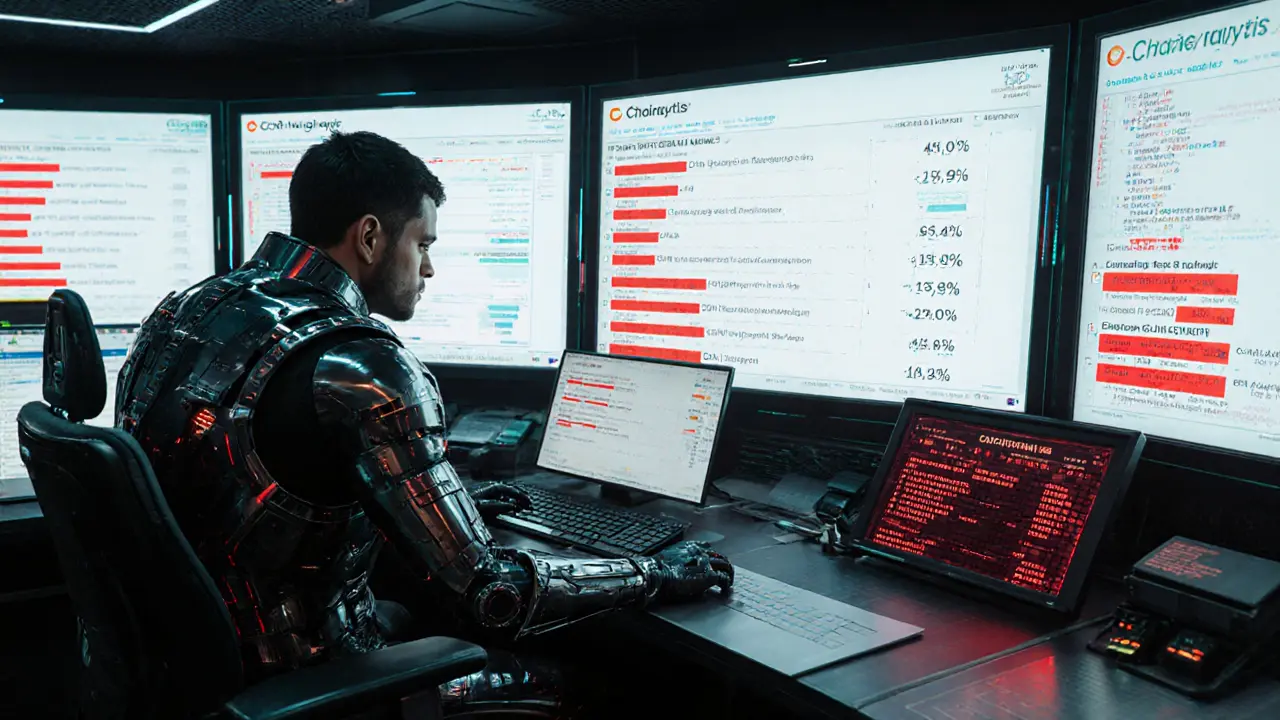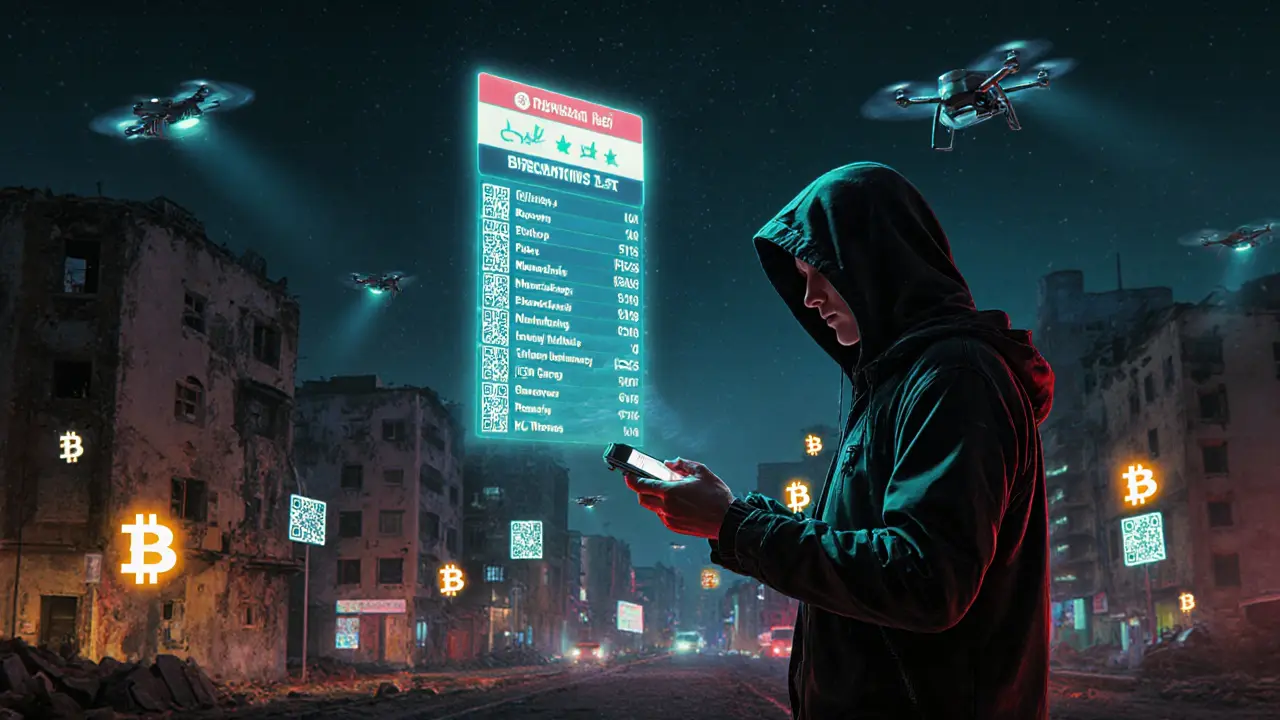Sanctions Compliance Checker
Check if your crypto transaction to Syria or Cuba complies with 2025 U.S. sanctions regulations.
For years, Syria and Cuba were locked under heavy U.S. sanctions that made even basic financial transactions nearly impossible. But in 2025, everything changed - and not in the way most people expected. While Syria saw a dramatic lifting of broad sanctions, Cuba got hit with even stricter rules. And cryptocurrency? It’s caught right in the middle.
Syria’s Sanctions Were Lifted - But Not Everything
On July 1, 2025, the U.S. officially ended its 21-year comprehensive sanctions regime against Syria. Executive Order 14312 revoked every prior order that had blocked trade, investment, and financial services with the country. The Central Bank of Syria was removed from the SDN List. U.S. banks could now open accounts with Syrian institutions. Exporting software, accounting services, or even cloud infrastructure to Syria became legal overnight. But this wasn’t a blanket amnesty. The U.S. kept targeted sanctions on key figures: President Bashar al-Assad’s family, senior military officials, and anyone tied to the captagon drug trade. If you’re doing business in Syria, you still need to check every counterparty against OFAC’s list. One wrong transaction - even with a seemingly legitimate company - can still trigger a $1 million penalty.Crypto in Syria: Legal Gray Zone, But Easier Access
Syria doesn’t have any laws that say cryptocurrency is legal or illegal. That means it exists in a legal vacuum. No licensing required. No exchange registration. No tax reporting rules. It’s unregulated - which sounds good until you try to get paid. After the sanctions lifted in July 2025, Binance and Kraken started allowing Syrian users to trade without restrictions. Local traders reported faster deposits and withdrawals. Peer-to-peer Bitcoin trading on LocalBitcoins surged. But here’s the catch: international banks still hesitate. Why? Because they’re scared of violating the remaining targeted sanctions. A Syrian business owner might have a clean record, but if their supplier is on OFAC’s list - even indirectly - the bank will freeze the transfer. Companies like Lightspark are stepping in with solutions. Their Grid Switch system lets businesses send payments through Syria’s domestic real-time payment network, using the Lightning Network only as a settlement layer. No crypto touches the end user. That’s smart compliance - avoiding direct exposure while still enabling cross-border value flow.Cuba: Sanctions Got Tougher, Not Easier
While Syria opened up, Cuba slammed shut. In June 2025, President Trump issued NSPM-5, reversing Biden’s 2024 easing measures. The Cuba Assets Control Regulations (CACR) were re-tightened. U.S. companies can’t even do business with Cuban entities through third-country subsidiaries anymore. The message was clear: no loopholes. In July 2025, Key Holding, LLC - a U.S.-based logistics firm - paid $608,825 to OFAC after its Colombian subsidiary shipped 36 freight containers to Cuba. The company didn’t know the cargo was going to Cuba. They thought they were shipping to a neutral port. OFAC didn’t care. The penalty stood. This is why compliance teams now treat Cuba like a no-go zone. Even indirect involvement - like paying a Cuban freelancer via PayPal, or using a Cuban-developed app hosted on a U.S. server - can be seen as a violation. The CACR applies to non-U.S. subsidiaries of U.S. persons. That’s wider than most sanctions regimes.
Crypto and Cuba: Almost Impossible to Use Legally
Cryptocurrency use in Cuba is technically possible - but legally risky. Cuban citizens can hold Bitcoin. They can receive it from family abroad. But if you’re a U.S. citizen or company, sending crypto to Cuba is still prohibited under CACR. Even using a decentralized exchange like Uniswap to send ETH to a Cuban wallet is a violation. OFAC has made it clear: crypto isn’t a workaround. In 2025, they added three Cuban-based crypto wallet providers to the SDN List. Their reasoning? These wallets were used to launder funds from Cuban state-owned enterprises. So now, even if you think you’re helping a Cuban family, you could be funding the regime. Some Cubans use P2P platforms like Paxful to receive USDT from relatives. But those platforms now block Cuban IP addresses. If you try to sign up from Havana, you get locked out. The only way left is through third-country intermediaries - which increases cost, delay, and risk.Why the Difference? Strategy Over Fairness
Why lift sanctions on Syria but tighten them on Cuba? It’s not about human rights or democracy. It’s about strategy. Syria’s regime, under President Ahmed al-Sharaa, made a deal: dismantle al-Nusrah Front (HTS), stop supporting the captagon trade, and cooperate on counterterrorism. In return, the U.S. removed broad sanctions. It was a transactional move - not a moral one. Cuba? No deal. The government hasn’t changed its stance on political repression, military deployments abroad, or its alliance with Russia and Iran. The U.S. saw no reason to reward it. In fact, tightening sanctions was meant to pressure Cuba into negotiations - even if those negotiations never happen.
What This Means for Crypto Businesses
If you’re running a crypto exchange, payment processor, or DeFi protocol, here’s your reality in 2025:- Syria: You can serve users - but only if you have a solid KYC/AML system. Screen every wallet address against OFAC’s targeted list. Don’t assume a Syrian user is clean just because the country is open.
- Cuba: Don’t even try. Block all Cuban IPs. Refuse any transaction linked to Cuban entities. The risk isn’t worth the reward.
- Both: Use geolocation tools, blockchain analytics (like Chainalysis or Elliptic), and transaction monitoring. One flagged wallet can get your entire platform flagged.
What’s Next?
The U.S. is moving toward smarter, more targeted sanctions - not blanket bans. Syria shows how lifting broad restrictions can open markets if you keep pressure on bad actors. Cuba shows that hardline tactics still work if the target won’t negotiate. Cryptocurrency isn’t going away. It’s becoming the new battleground for sanctions enforcement. Regulators know crypto can bypass banks. So they’re adapting: adding crypto addresses to SDN lists, requiring blockchain analytics for compliance, and training investigators to trace on-chain flows. The bottom line? In 2025, you can’t ignore sanctions. Not in Syria. Not in Cuba. And definitely not in crypto.Can I send crypto to Syria now?
Yes, you can send crypto to Syria as of July 2025, since broad U.S. sanctions were lifted. But you must still screen every recipient address against OFAC’s targeted sanctions list. If the wallet is linked to the Assad family, a captagon trafficker, or any sanctioned individual, sending funds is still illegal - even if the country as a whole is open.
Is cryptocurrency legal in Cuba?
Cuban citizens can hold and use cryptocurrency privately, but U.S. persons and companies are still prohibited from engaging in any transaction involving Cuba - including crypto. Sending Bitcoin, USDT, or any digital asset to a Cuban wallet violates the Cuba Assets Control Regulations (CACR), even if the transaction is done through a decentralized exchange.
Why did the U.S. lift sanctions on Syria but not Cuba?
The U.S. lifted sanctions on Syria because the Syrian government agreed to dismantle terrorist groups like HTS and stop supporting the captagon drug trade. It was a strategic deal - not a moral one. Cuba, by contrast, has made no such concessions. It continues to support Russia, Iran, and authoritarian regimes abroad. The U.S. sees no reason to ease pressure.
Can U.S. companies do business with Syrian banks now?
Yes. As of July 1, 2025, U.S. banks can open correspondent accounts with Syrian financial institutions, including the Central Bank of Syria. However, they must still screen all customers and transactions against OFAC’s targeted sanctions list. Any individual or entity tied to the Assad regime or illicit trade remains off-limits.
What happens if I accidentally send crypto to a sanctioned person in Syria?
Even unintentional transactions can result in penalties. OFAC has said it considers intent, but ignorance is not a defense. If you send $10,000 in USDT to a wallet linked to a sanctioned individual, you could face civil fines up to $1 million or more. Always use blockchain analytics tools and screen addresses before sending.






Comments
23 Comments
Brian Collett
So Syria’s open for crypto now, but Cuba’s still locked down? That’s wild. I get the strategic angle, but it feels like the U.S. is playing favorites. If crypto is supposed to be decentralized, why are we still treating it like a geopolitical chess piece?
Also, anyone else notice how Lightspark’s Grid Switch is basically a backdoor for compliance? Smart, but also kind of a hack.
Allison Andrews
The distinction between broad and targeted sanctions is legally sound, but ethically messy. We’re not sanctioning nations anymore-we’re sanctioning people, while pretending the rest are innocent. The truth is, in Syria, everyone’s still connected to someone on the list. And in Cuba, even your cousin’s Bitcoin wallet is now a national security concern.
Wayne Overton
Cuba’s a dictatorship. Syria’s a dictatorship. Why help one and not the other? Simple. Syria’s useful. Cuba’s not. End of story.
Alisa Rosner
⚠️ IMPORTANT: If you’re sending crypto to Syria, ALWAYS use a blockchain scanner like Chainalysis or Elliptic! 🛡️ Even if the country is ‘open,’ one wrong address = $1M fine. 🚨 Also, don’t trust P2P platforms-many now auto-block Syrian IPs. Use Lightspark or similar compliant tools. 💡 You’re not just being careful-you’re being smart. 💪
MICHELLE SANTOYO
Oh wow, so now the U.S. gets to decide who gets to be free and who doesn’t? That’s not sanctions-that’s colonialism with a crypto twist. 🤡
Next they’ll say ‘we lifted sanctions on Syria because we like their new face’-like they’re picking a president on The Bachelor. 🎭
Meanwhile, Cuba’s just trying to survive. But hey, if you’re not aligned with Washington’s latest mood swing, you’re the villain. Classic.
Lena Novikova
Everyone’s acting like this is new news. Newsflash: crypto was always a sanctions workaround. The only thing that changed is the U.S. finally admitted it. They didn’t ‘lift’ sanctions-they just stopped pretending they could control blockchain. Cuba? Still a target because they don’t bow. Simple.
Olav Hans-Ols
Really interesting breakdown. I’ve been watching this whole thing unfold and it’s wild how the same tech can be a lifeline in one place and a threat in another. Maybe the real story isn’t the sanctions-it’s how crypto is forcing us to rethink what ‘sovereignty’ even means anymore. 🤔
Also props to Lightspark. That’s the kind of innovation we need-practical, not ideological.
Kevin Johnston
Big win for Syrians! 🎉 Crypto’s gonna change lives there. Stay safe out there, and keep building! 💪🚀
Paul Lyman
Guys I just want to say this is huge for people in Syria who’ve been cut off for decades. I know a guy in Damascus who runs a small clinic-he’s finally getting medical supplies paid for in BTC. No more waiting 6 months for wire transfers. This isn’t politics, this is real life.
And for Cuba? Yeah it sucks. But the regime’s still sending troops to Russia. So... yeah. I get it. Not perfect, but not arbitrary either.
Also if you’re a dev building a wallet, please add OFAC screening. It’s not hard. I’ve done it. Just use the API. You’ll thank me later.
Frech Patz
One must consider the legal implications of extraterritorial enforcement under the CACR. The jurisdictional reach of U.S. sanctions over non-U.S. subsidiaries constitutes a significant expansion of sovereign authority, arguably exceeding customary international law norms. The precedent set here may invite reciprocal measures from other states in the future, particularly in the domain of digital asset regulation.
Rosanna Gulisano
Cuba’s people are suffering. Syria’s people are suffering. Why does the U.S. get to pick which one we care about? Hypocrites.
Sheetal Tolambe
This is actually so inspiring for us in India too. We’ve seen how crypto helps small businesses bypass banking delays. If Syria can use it to rebuild, maybe we can learn from their approach. Also, Lightspark’s model is genius-using local rails with blockchain settlement? That’s the future. 🙌
gurmukh bhambra
They’re lying. The U.S. didn’t lift sanctions. They just moved them to the blockchain. Now they’re tracking every single BTC transaction. The whole thing is a trap. The Fed’s using crypto to control the world. You think Syria’s free? Nah. They’re just being watched better now. Watch your wallet.
Sunny Kashyap
Why even care about Syria or Cuba? U.S. should focus on India. We don’t need their sanctions. We got our own crypto now. End of story.
james mason
How quaint. You think a ‘sanctions-aware wallet’ is innovation? That’s just compliance theater. Real decentralization would mean no OFAC lists. No banks. No governments. Just code. But you’re all too cozy with the system to see that.
Anna Mitchell
It’s nice to see some progress for Syria. Hope it helps people there. I just hope the crypto access doesn’t get taken away again. It’s fragile.
Pranav Shimpi
Lightspark’s Grid Switch is brilliant but underreported. They’re using the Lightning Network as a settlement layer over Syria’s domestic system-so no crypto ever touches the end user. That’s how you do compliance without killing innovation. Also, OFAC’s adding wallet addresses to SDN? Genius move. Now even crypto can’t hide dirty money. This is the future of sanctions.
jummy santh
As a Nigerian, I see parallels. Our own banking system has been crippled by sanctions and restrictions for years. Crypto became our bridge. The fact that Syria is now using similar pathways gives me hope. But Cuba’s situation is heartbreaking-when the people are punished for the sins of their leaders, it’s never justice. It’s just cruelty.
Kirsten McCallum
Everyone’s acting like this is a breakthrough. It’s not. It’s just another way for the U.S. to control who gets to thrive. You think Syria’s free? They’re just on a different leash.
Henry Gómez Lascarro
Let me be clear: this entire narrative is propaganda. Syria didn’t ‘cooperate’-they were forced into a deal under threat of total annihilation. Cuba didn’t ‘refuse’-they were punished for refusing to be a U.S. satellite. The U.S. doesn’t care about terrorism or drug cartels. They care about control. And now, with crypto, they’ve found the perfect tool: blockchain surveillance. Welcome to the digital iron curtain. You’re not free. You’re just being monitored by a different kind of cop.
Will Barnwell
Lightspark? Sounds like a startup name. Who even uses that? And why does everyone think blockchain analytics are foolproof? I’ve seen false positives on Chainalysis. You freeze a guy’s wallet because his uncle once sent him $100 and now he’s a terrorist? This whole system is broken.
Lawrence rajini
Syria’s got a shot now. Let’s cheer for that. 🙌 Crypto’s not perfect, but it’s giving people power. Cuba? Tough. But change takes time. Keep building, keep sending. The tech will win in the end. 💪🌐
Brian Collett
Wait, so if I send crypto to a Syrian business, and their supplier is on OFAC’s list, I’m liable? Even if I didn’t know? That’s insane. So now I need to run a full chain analysis on every single transaction? That’s not compliance-that’s a full-time job.
Write a comment